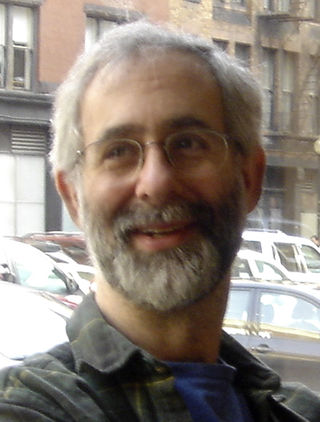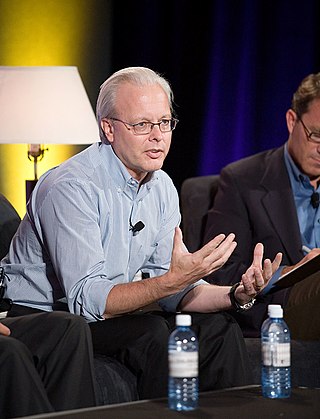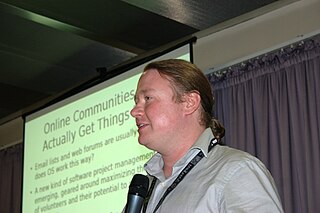
Robert M. Frankston is an American software engineer and businessman who co-created, with Dan Bricklin, the VisiCalc spreadsheet program. Frankston is also the co-founder of Software Arts.

Daniel Singer Bricklin is an American businessman and engineer who is the co-creator, with Bob Frankston, of VisiCalc, the first spreadsheet program. He also founded Software Garden, Inc., of which he is currently president, and Trellix, which he left in 2004. He currently serves as the chief technology officer of Alpha Software.

Lotus 1-2-3 is a discontinued spreadsheet program from Lotus Software. It was the first killer application of the IBM PC, was hugely popular in the 1980s, and significantly contributed to the success of IBM PC-compatibles in the business market.

VisiCalc is the first spreadsheet computer program for personal computers, originally released for the Apple II by VisiCorp on October 17, 1979. It is considered the killer application for the Apple II, turning the microcomputer from a hobby for computer enthusiasts into a serious business tool, and then prompting IBM to introduce the IBM PC two years later. More than 700,000 copies were sold in six years, and up to 1 million copies over its history.

Lotus Improv is a discontinued spreadsheet program from Lotus Development released in 1991 for the NeXTSTEP platform and then for Windows 3.1 in 1993. Development was put on hiatus in 1994 after slow sales on the Windows platform, and officially ended in April 1996 after Lotus was purchased by IBM.
Lotus Software was an American software company based in Massachusetts; it was sold to India's HCL Technologies in 2018.

Raymond "Ray" Ozzie is an American software industry entrepreneur who held the positions of Chief Technical Officer and Chief Software Architect at Microsoft between 2005 and 2010. Before Microsoft, he was best known for his role in creating Lotus Notes.

Brian Behlendorf is an American technologist, executive, computer programmer and leading figure in the open-source software movement. He was a primary developer of the Apache Web server, the most popular web server software on the Internet, and a founding member of the Apache Group, which later became the Apache Software Foundation. Behlendorf served as president of the foundation for three years. He has served on the board of the Mozilla Foundation since 2003, Benetech since 2009, and the Electronic Frontier Foundation since 2013. Behlendorf served as the General Manager of the Open Source Security Foundation (OpenSSF) from 2021-2023 and is currently the Chief Technology Officer of the OpenSSF.

Brad Templeton is a Canadian software developer, internet entrepreneur, online community pioneer, publisher of news, comedy, science fiction and e-books, writer, photographer, civil rights advocate, futurist, public speaker, educator and self-driving car consultant. He graduated from the University of Waterloo.

Visi On is a graphical user interface (GUI)-based operating environment program for IBM compatible personal computers running MS-DOS. Visi On was developed by VisiCorp. It was one of the first GUIs on a personal computer. Visi On was never popular, as it had steep minimum system requirements for its day, but it was influential in the development of later GUIs like Microsoft Windows.

VisiCorp was an early personal computer software publisher. Its most famous products were Microchess, Visi On and VisiCalc.

Freada Kapor Klein is an American venture capitalist, social policy researcher and philanthropist. As a partner at Kapor Capital and the Kapor Center for Social Impact, she is known for efforts to diversify the technology workforce through activism and investments. Her 2007 book Giving Notice: Why the Best and the Brightest Leave the Workplace and How You Can Help Them Stay examines the reasons people have for leaving corporate America as well as the human and financial cost.
Data Interchange Format (.dif) is a text file format used to import/export single spreadsheets between spreadsheet programs.

Sevin Rosen Funds (SRF) is a Texas-based venture capital firm credited with pioneering the personal computing revolution in the 1980s and also venture investing in Dallas. It was established in 1981 by L. J. Sevin, a former Texas Instruments engineer, and Ben Rosen, and was one of the leading investors on the US West Coast.
The Electronic Frontier Foundation (EFF) is an international non-profit digital rights group based in San Francisco, California. It was founded in 1990 to promote Internet civil liberties.
Edward M. Esber, Jr. is semi-retired in Park City, Utah. Ed spends his time helping the State of Utah, Utah Law enforcement and the Silicon Slopes entrepreneur community in Utah.
Sorcim Corporation was an early start-up company in Silicon Valley, founded in June 1980 by Richard Frank, Paul McQuesten, Martin Herbach, Anil Lakhwara, and Steve Jasik - all former Control Data Corporation employees working in the Language Group in Sunnyvale, CA. Jasik left company early on, to develop the MacNosy product for the Macintosh.
Concentric Data Systems, Inc. was founded in December 1979 by John J. Henderson and Jonathan Sachs, both having left their jobs as system programmers at Data General Corporation. Originally, the company undertook a variety of software consulting projects for the Data General line of computers. In 1981, the company developed a spreadsheet product, CompuCalc, that ran on Data General hardware and was modeled after VisiCalc.

Jonathan Rotenberg is an executive coach, management consultant, and author. In 1977, he cofounded The Boston Computer Society, which became the world's largest personal computer user organization. He is currently writing a book about what he learned from his early mentor, Apple founder Steve Jobs.

Samuel Jerrold "Jerry" Kaplan is an American computer scientist, author, futurist, and entrepreneur. He is best known as a pioneer in the field of pen computing and tablet computers. He is the founder of numerous companies, including GO Corporation, whose technology was used to develop the first smartphone and tablet PC. Kaplan is the co-founder of OnSale, the first B2C online auction site launched in 1994, five months prior to eBay. He is a recipient of the 1998 Ernst & Young Emerging Entrepreneur of the Year Award and author of the best-selling book Startup: A Silicon Valley Adventure. He has been featured in major news publications, including The New York Times, The Wall Street Journal, Forbes, Red Herring, and Bloomberg Businessweek. Kaplan is also the author of the 2015 book Humans Need Not Apply: A Guide to Wealth and Work in the Age of Artificial Intelligence. Additional companies he has co-founded include artificial intelligence company Teknowledge, Inc. and social game website Winster.com. Kaplan was briefly a Fellow at the Stanford Center for Legal Informatics.













